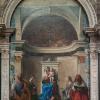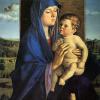Jacopo Antonio Marcello Presents the Manuscript of Strabo to Rene d'Anjou (1459)
This 1459 miniature highlights another element of the social context of humanism – princely patronage – as well as the central role in the movement played by books. The Venetian patrician and senator Jacopo Antonio Marcello presents a copy of Strabo’s Geography to René of Anjou, a French prince who was count of Provence and pretender to the throne of Naples. The translation of Strabo from Greek into Latin had been commissioned by Pope Nicholas V from the famous humanist educator Guarino of Verona, although Marcello stepped in and supported the project after the pope’s death (another miniature depicts Guarino handing the volume to Marcello). Although they never met in reality, Marcello was one of René’s political supporters and a member of his chivalric order; the book represents their relationship, as well as the transfer of knowledge, from Greece to Rome (Italy) and beyond. The text of Strabo was given to Pope Nicholas by Cardinal Isidore of Kiev after the fall of Constantinople to the Ottomans (1453), an event that proved a catalyst for intensified interest in the Greek classics. Guarino was himself celebrated for his teaching of Northern European students, perhaps especially from England and Hungary. The numerous international connections embodied in this image therefore present a different picture to the Italocentric impression often given by studies of the world of Quattrocento humanism.
Hunting for manuscripts of classical texts and producing editions and translations of them were perhaps the central humanist activity, before and after the rise of print. This miniature actually comes from within the book itself, and was likely an early work by the important Venetian artist Giovanni Bellini (c.1430-1516). It was painted in Padua, an important university town and a centre of cultural exchange.
Credit: Oren Margolis (July 2018)


